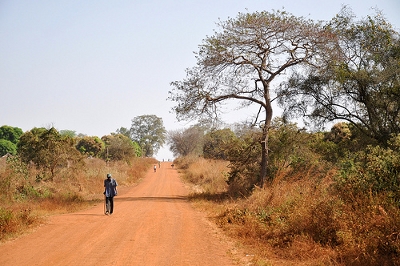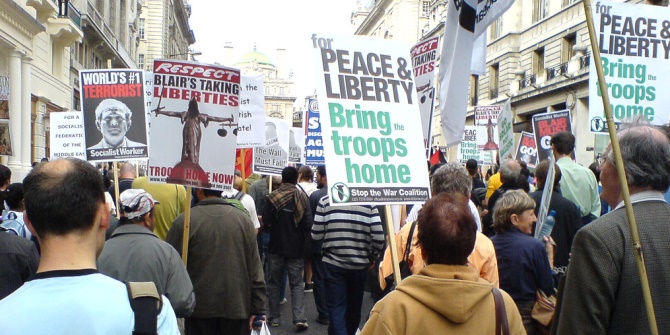 With Sudan due to split into two nations this July, both will need support from the international community to assist in their transitions. In light of the coalition’s recent freeze in the UK’s aid budget, some have suggested increased trade links with the country, but Avery Hancock finds that increasing trade may not provide the solution envisioned by some; aid is still very important at this turbulent time for the Sudan.
With Sudan due to split into two nations this July, both will need support from the international community to assist in their transitions. In light of the coalition’s recent freeze in the UK’s aid budget, some have suggested increased trade links with the country, but Avery Hancock finds that increasing trade may not provide the solution envisioned by some; aid is still very important at this turbulent time for the Sudan.
Just weeks before the days of rage took off in Tunisia, Egypt, Yemen and Libya a monumental referendum took place in Sudan to determine whether Africa’s largest country would remain unified or if the South would secede from the North. The official results announced on the 7th of February confirmed an overwhelming desire of Southern Sudanese to secede- of the 99 per cent of Southerners who voted in the referendum 99.7 per cent voted for independence. David Cameron welcomed the results and encouraged North and South to continue to work together on outstanding issues, while President Obama announced that the US would formally recognize southern Sudan as a ‘sovereign, independent’ state in July, when the vote will come into effect. By all accounts it seems a new state is born.

The referendum was the major linchpin of the 2005 Comprehensive Peace Agreement (CPA), the deal that formally ended the decades-long war between North and South in which an estimated two million people were killed and over four million were displaced. Shortly after the preliminary results were announced foreign Secretary William Hague announced he welcomed the results but cautioned that “there remains a huge amount for the Sudanese parties to do before the conclusion of the Comprehensive Peace Agreement, and independence of Southern Sudan, on 9 July 2011.”
This is no exaggeration. While the South already boasts a flag and national anthem (selected X-factor style) it has not chosen an official name or decided whether to stick with the Sudanese pound or adopt its own currency. If the referendum’s legitimacy is questioned the new state could be mired in a Kosovo-style situation. There are a number unresolved issues with the North- including the border demarcation of the oil-rich Abeyi area, where violent clashes have continued right up through the referendum, and the larger issue of how oil revenues will be split between North and South (with the resources in the south but pipelines running to refineries in the north.) The status of southerners living in the North is still unclear, amidst concerns that President Omar al-Bashir, currently indicted for war crimes in Darfur, will tighten the grip of sharia law.
On top of this, southern Sudan is one of the most underdeveloped regions in the world; as DFID Secretary Andrew Mitchell recently pointed out, illiteracy is over 80 per cent and there are only 24km of paved roads in a territory the size of Spain and Portugal (one of the reasons the referendum took place over an entire week). According to Africa experts at Chatham House an independent Southern Sudan would be one of the poorest states in the world and rely heavily on foreign aid. And as Baroness Cox , a longtime supporter of Sudan, pointed out, the strain on the South’s limited resources are likely to be exacerbated if thousands of southerners return from the North. The current Government of Southern Sudan (GoSS), created under the 2005 peace deal, has limited governance capacity and according to a recent Human Rights Watch report, has made limited progress in establishing the rule of law.
The UK, along with the US and Norway, was one of the ‘international guarantors’ of the agreement and one of the country’s largest bilateral donors. Since 2007 the Department for International Development (DFID) has contributed almost £300 million to local and international NGOs providing humanitarian assistance, health, education, and governance, in the North and South; Mitchell claims 4.5 million people in Sudan are benefitting from UK food aid alone. This is alongside nearly £100 million to support the UN Mission in Sudan, and over £15 million to referendum-related contingency preparedness (the ballot papers themselves were printed in the UK).
DFID pledged to continue to work in the north and south “whatever the result of referendum” but will not disclose how much aid will flow until the department completes its bilateral aid review of the country, a process it is undertaking in all recipient countries in order to focus aid on fewer but ‘better-targeted’ countries. After investing so much in the Sudan peace process it seems sensible for DFID to maintain or increase its aid; the establishment of a new state is the ultimate test of the Peace Agreement and the cost of failure, in terms of a return to war, would be catastrophic. By way of comparison, in 2008/2009 DFID contributed £17 million of of bilateral aid to newly independent Kosovo; and this year the UK’s contributions to EU and UN missions in Kosovo are estimated to be around £25 million; this for a country 0.25 per cent the size of Sudan.
But with the aid budget frozen for two the next two years it seems unlikely that Sudan will get an extra boost from UK aid. In a recent speech at the London School of Economics, Harriet Harman MP described the Conservative’s commitment to contributing 0.7 per cent of GNI to aid by 2013 as ‘fragile,’ and public increasingly skeptical of foreign aid spending while cuts are being made at home (frustration that is not helped by the £1.85 million in DFID cash spent on the Pope’s visit to Britain.) She warned that the freeze will cost £2.2 billion which would otherwise have been available in development aid. If the target is to be met the budget will have to increase by £3billion in 2013 alone.
A logical response from cash-strapped DFID would be to increase trade links, rather than bilateral aid, with the country. The Foreign Officer’s minister for Africa, Henry Bellingham embarked on a ‘vigorous trade mission’ in Khartoum before the coalition government was formed and supported a UK trade and investment ‘opportunities in Sudan’ event recently in London. It is no secret that Sudan is the sixth biggest oil exporter to China and that the US is considering lifting its trade sanctions the if the CPA is implemented peacefully.
Under Labour Britain did not hold sanctions against the Kharthoum regime but embarking on a ‘trade first’ policy is in danger of violating Hague’s own assertion that the UK ‘should never turn a blind eye to countries…that violate human rights.’ The UK’s relationship with the North is likely to come under more scrutiny as protests in Kharthoum confirm the country is having its own ‘Egypt’ moment, albeit in a muted way, due in part to concerns about the upcoming split in July.
While trading with the Bashir’s regime could be considered morally dubious, jumping in on the oil bonanza in a newly independent South carries its own risks; that the country does not have the institutions in place to ensure that oil revenues contribute to badly-needed development. This is why the UK and other donors should continue to support humanitarian and governance projects to assist people in the South and vulnerable communities in the North- particularly Darfur. Supporting Sudan through trade and aid, would not only help consolidate the peace agreement but could contribute to stability in an increasingly volatile part of the world.
Click here to respond to this post.
Please read our comments policy before posting.







1 Comments